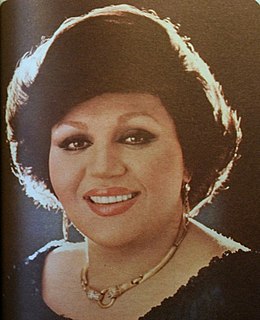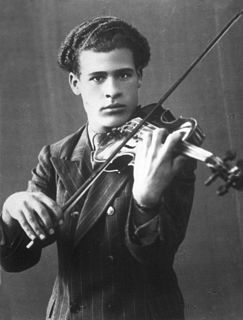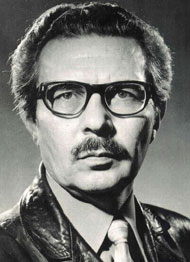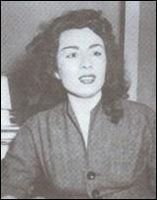
Ahmad Shamlou was an Iranian poet, writer, and journalist. Shamlou was arguably the most influential poet of modern Iran. His initial poetry was influenced by and in the tradition of Nima Youshij. In fact, Abdolali Dastgheib, Iranian literary critic, argues that Shamlou is one of the pioneers of modern Persian poetry and has had the greatest influence, after Nima, on Iranian poets of his era. Shamlou's poetry is complex, yet his imagery, which contributes significantly to the intensity of his poems, is accessible. As the base, he uses the traditional imagery familiar to his Iranian audience through the works of Persian masters like Hafez and Omar Khayyám. For infrastructure and impact, he uses a kind of everyday imagery in which personified oxymoronic elements are spiked with an unreal combination of the abstract and the concrete thus far unprecedented in Persian poetry, which distressed some of the admirers of more traditional poetry.
"Ey Iran" is an Iranian nationalist song that serves as the country's unofficial national anthem. The music was composed by Ruhollah Khaleghi, and the lyrics were written by Hossein Gol-e-Golab. This anthem was first performed by Gholam-Hossein Banan.

Ma'soumeh Dadehbala, known by her stage name Hayedeh, was an Iranian classical and pop music vocalist with a contralto vocal range. She was well known for her wide range of voice. She was active for more than two decades, and remains one of the most popular singers of Iran.

Gholām-Hossein Banān was an Iranian musician and singer. One of the most prominent Iranian singers of the 20th century, he was renowned for the quality of his voice.

Rahi Mo'ayeri, real name: Mohammad Hasan Mo'ayyeri, was an Iranian poet and musician.

Rūhollāh Khāleghi, also spelled as Khaleqi, was a prominent Iranian musician, composer, conductor and author.

Fatemeh Solati, better known by her stage name Shohreh, is an Iranian singer. Since the Islamic Revolution in Iran, she has continued her music career in exile.

Ahmad Ebādi was an Iranian musician and setar player. Born in Tehran, he was a member of the most extraordinary family of Iranian music. Ahmad's father, Mirza Abdollah, is arguably the most influential figure in Persian traditional music, and his paternal uncle, Mirza Hossein Gholi, is also well known for his mastery in playing the tar. Ahmad's paternal grandfather, Ali Akbar Farahani, was also a talented musician.

'Ostad (“Master”) Mahmoud Zoufonoun' was an accomplished musician in the art of Persian traditional music.
Since the Iranian revolution, Iranian female solo vocalists are permitted to perform for female audiences. Female vocalists can perform for male audiences only as a part of a chorus. The prominent classical singer Fatemeh Vaezi, has given concerts accompanied by a female orchestra. She has also performed widely in Europe and the United States. Parisa has also assembled a five-piece female orchestra. After 1986 Maryam Akhondy, the classical trained singer from Tehran, started working with other Iranian musicians in exile. With Nawa and Tschakawak she performed in Germany and Scandinavia. At the same time she founded Ensemble Barbad, another group of traditional Iranian art music, which has been touring all over Europe for the past years. In 2000 Maryam Akhondy created the all-female a cappella group named Banu as a kind of musical expedition to the different regions and cultures of Iran. For this project Maryam Akhondy over years collected old folk songs, which were sung only in private sphere, where women are alone or among themselves: at the cradle, doing housework, working in the fields, and women's celebrations. Maryam Akhondy made it her business to bring traditional women’s songs back to life again. The well-known classical and folk singer. Sima Bina, who is also a visual artist, has taught many female students to sing. She has also been permitted to give concerts for women in Iran, and has performed widely abroad.

Ali-Naqi Vaziri, also transcribed as Ali Naghi Vaziri was a composer, thinker and a celebrated player of the tar. He is considered as a revolutionary icon in the history of 20th century Persian music.

Ali Tajvidi was an Iranian musician, composer, violinist, songwriter, and music professor at the School of National Music and Tehran University. He composed more than 150 songs and discovered and produced for many Persian performers such as Delkash and Hayedeh. He was born in Tehran, where his father was active as a painter in the style of Kamal-ol-Molk. In his youth he took violin lessons for two years under Hossein Yahaghi and for many years was under the tutelage of Abol-Hassan Saba for the violin as well. also took Harmony lessons under Houshang Ostovar.

Mazhar Khaleghi is a Kurdish singer of Iran's Kurdistan region, famous for his folklore Kurdish music. He currently resides in the United Kingdom.

Emamzadeh Taher is located in Iran in the town of Karaj, is one of the most famous cemeteries in Iran.

Samin Baghtcheban was an Iranian composer, author and translator.

Ghazaleh Alizadeh ; 15 February 1949 – 12 May 1996) was an Iranian poet and writer. Her mother was also a poet and writer. She married twice; she and her husband Bijan Elahi had a daughter called Salma. She also adopted two girls who were survivors of the 1961 Qazvin earthquake.

Mahsa Vahdat is a Persian classical and world music vocalist.

Minoo Khaleghi is an Iranian jurist and reformist activist. In the 2016 parliamentary elections, Khaleghi won a seat, however she was disqualified by the Guardian Council after the election.
Majid Salek Mahmoudi was an Iranian serial killer, who killed 24 people between 1981 and 1985.

Sahar Moghadass, known mononymously as Sahar, is an Iranian singer, musician and dancer. She is known for her contributions to Persian pop music.

















